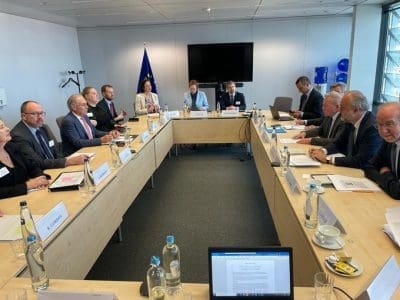Trade Minister Don Farrell meeting with EU trade representatives in Brussells last month. Image: EU commissioner
Janusz Wojciechowski, Twitter
Prime Minister Anthony Albanese is also in Europe from today until Wednesday, traveling to Berlin and then Lithuania where he will also meet with senior European Commission figures to discuss the finalisation of a Free Trade Agreement between Australia and the European Union.
Negotiations for a trade deal stalled during Mr Farrell’s previous visit to Europe last month.
Mr Farrell said discussions remain difficult and have reached a point “where issues vital to Australia’s national interest must be improved”.
“The Government remains strongly committed to the best possible deal for Australian businesses, farmers, workers and the broader community.
“I am prepared to persist even if it means the negotiations extend into the second half of this year.”
While in Brussels this week Mr Farrell will meet with his counterpart, Executive Vice-President and European Commissioner for Trade, Valdis Dombrovskis, as well as the EU Commissioner for Agriculture, Janusz Wojciechowski.
A trade agreement with the EU would unlock an overall market of 445 million people and a GDP of $24 trillion.
As a bloc, the EU is Australia’s third-largest trading partner, with total two-way trade (goods and services) worth $97 billion in 2021-22.
EU’s powerful farm lobby have so far resisted moves to grant more access to European markets for Australian products.
There are also reports that the European negotiators are intent on using trade agreements to export the European regulatory system around the world, which could include placing restrictions on agricultural products grown on areas that were once forested.
National Farmers’ Federation chief executive Tony Maher told the mainstream media the peak farming body backs the federal government in walking away from the EU free trade agreement “if it’s not a good deal for Australian farmers”.
EU trade deal must be in the national interest
Shadow Minister for Trade and Tourism, Kevin Hogan, expressed concern that the timetable for finalising a trade agreement was being made around the Prime Minister’s travel plans.
He said a trade agreement with the EU must provide significant market access for Australian agricultural products.
“There must be no compromise on the EU’s demands on geographical indicators,” Mr Hogan said.
“A trade agreement must include a roadmap to fully liberalised trade in exchange for preferential access to our critical minerals.
“This is not just for today’s exporters but generations of exporters over the next 50 plus years.
“And it must not include a long list of EU ‘conditions’ on Australian exports such as restricting beef exports to grass fed beef only.
“There are genuine concerns in the ag sector that the EU is seeking to export its view of farming through this free trade agreement. The EU’s conditionality requirements have no place here and must be strenuously rejected by the PM and the Minister for Trade and Tourism.
“Simply put, unless the EU makes a vastly improved offer from its previously only weeks old attempt, it is not a trade deal worth doing. Not even if it suits the PM’s travel itinerary.”


HAVE YOUR SAY